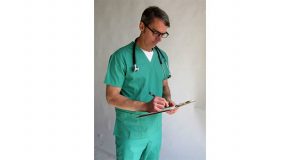Young Male Nursing Applicants Surge After ‘We Are The NHS’ Recruitment Campaign
 A record breaking number of male school leavers have applied to be nurses following NHS England’s successful “We Are The NHS” recruitment campaign.
A record breaking number of male school leavers have applied to be nurses following NHS England’s successful “We Are The NHS” recruitment campaign.
The number of 18-year-old men applying to study nursing has increased by more than 50% in a decade, according to new figures from UCAS, the body that arranges university courses.
Since last year, there has been a total 9% jump in men applying to study nursing, showing that attitudes are changing towards a career that has often wrongly been portrayed as a female profession.
Casualty actor Charles Venn, 45, who plays nurse Jacob Masters in the BBC1 series, welcomed the rise and said he hoped his role had helped change misconceptions of the profession.
Backing the “We Are The NHS” campaign, the actor, who has starred in the series since 2015 said: “It’s really encouraging to see that more men are considering a career in nursing. It’s been an honour playing a male nurse in Casualty. Portraying Jacob for the last few years has I hope broken down barriers and misconceptions about what a traditional nurse looks like. I hope this is just the start.”
The overall trend of declining nursing applications seen in recent years has reversed following the launch of the “We Are The NHS” campaign launched to coincide with the health service’s 70th birthday last summer.
A total of 30,650 people applied for nursing degrees this year, up 4.3% on 2018. Applications had previously dropped by almost a third, 31%, between 2016 and 2018.
Some 2,650 men applied for nursing and midwife courses, up 210 on the previous year.
Male nurse Frankie Caruana, 52, who starred in the campaign, encouraged more men to consider the career.
Frankie, a Senior Orthopaedic Practitioner from William Harvey Hospital in Ashford, Kent said: “It surprises me that some people still think nursing is not an option for men. I never feel prouder than when I’m making a difference to people’s lives day in day out. I’d recommend a nursing career to anybody – man or woman.
“Nurses in the NHS touch lives at times of basic human need, when care and compassion are what matter most and work as part of a supportive and inspiring team of people, who contribute to a valuable and enjoyable career.”
The “We Are The NHS” campaign highlighted the vast range of opportunities available in the NHS for new recruits and put the spotlight on nursing; prioritising key areas including mental health, learning disability and community and general practice nurses, all helping to deliver the long term plan for the NHS.
Director of Nursing for transformation at NHS England Paul Vaughan said: “Nurses are at the heart of people’s NHS care so it’s encouraging to see such an uptake in nursing applications since the launch of the campaign – especially amongst men.
“We want to get young people, including boys, to think about a career in nursing from an early age, which is why NHS England has been working for some time with families and schools to highlight the huge positive impact we can have for patients and the many roles available within the profession.
“Nursing opens up so many doors into healthcare, while the role of nurses and midwives has also changed, with roles working in GP surgeries and caring for those with mental ill health and learning disabilities opening up to new nurses.”
Lisa Bayliss-Pratt, Chief Nurse, Health Education England said: “HEE welcomes the increase in the number of applications to nursing and midwifery courses, especially among 18-19 year olds who were the focus of our #KnowAboutNursing campaign last summer, and our work to support the “We are the NHS” campaign.
“Through these campaigns we have also worked with NHS England, NHS Improvement and the DHSC to challenge the stereotypical image of nursing as a female career so the increase of 9% among male applicants (19% among 18 year olds) is particularly excellent news.
“We know there is still much to do so we will continue to work with partners to attract even more people to nursing as a career, leading to better care for patients.”






